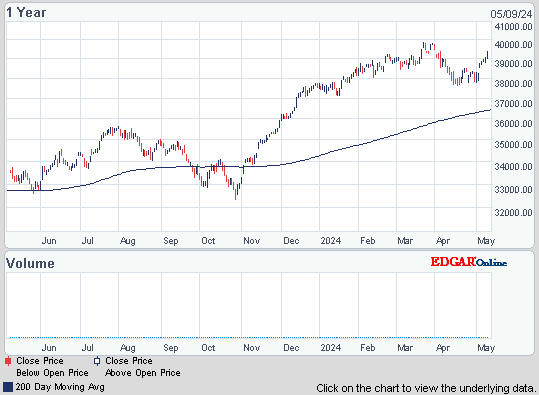Dow drifted staying close to breakeven all day finishing down 11 3, advancers ahead of decliners 3-2 & NAZ slid 2. The Financial Index was up a fraction to the 191s, a new 6 month high.
The Alerian MLP Index rose 4, taking it sooo close to 400 (a fresh record), while the REIT index was up a fraction to 241. Junk bond funds held onto AM gains but Treasuries fell back. Oil rose, trying to get back over $100 & demand for gold is strong again with growing tensions in Europe & the Mideast.
![Live 24 hours gold chart [Kitco Inc.]](http://www.kitco.com/images/live/gold.gif)

While Greece is at the center of the troubles right now, the economic effects of the EU crisis could affect markets around the globe. 18% of US exports went to the EU during the first 11 months of 2011. An economic crisis in Europe directly threatens US firms, especially manufacturers. If the Eurozone faces a deep & prolonged recession, the US economy would take a hit as exports fall. Greece owes €14.4B ($18.5B) to bondholders on Mar 20. After a weekend of haggling, a deal has yet to be struck. Without a deal, Greece would enter what some are calling a "hard default." That means Greece simply would run out of money to pay creditors. A hard default could trigger a severe recession in Europe & cripple US credit markets. The Eurozone GDP growth forecast for 2012 is just 0.3%, (estimated last week by the World Bank). The European Commission estimated in Nov that 2012 growth will be 0.6%, still looks dire. In addition to the blow a recession would deal to US exports, it could create problems for a host of other companies: US firms have over $1T of direct investment in the EU. A European recession would make for diminished economic confidence, in Europe & across the globe . Less confidence means less spending & investing, spelling trouble for everybody. This is a scenario worth thinking about.
How Europe's Crisis Could Hurt the U.S. Economy
European finance ministers applied pressure on Greece's private creditors to reach an agreement to cut the country's massive debt load. The creditors were warned that they may be forced to take losses. Time is running out for Greece to reduce its debt as talks hit an impasse over the weekend. The deal would involve private creditors swapping old Greek bonds for ones with 50% lower face value. The new, lower priced bonds, would also have much longer maturities, pushing repayments decades into the future, & will pay a much lower interest rates than Greece currently pays. Their haircut would be much more than 50%. The gov & representatives for the private creditors said they are moving closer to a final deal. But any agreement also has to be signed off by the other 16 countries that also use the € & the IMF, who have made the deal a key condition of the country winning any further bailout loans. This story has not changed for weeks, however now the deadline is approaching fast.
EU ministers push bondholders in Greek deal AP
Photo: Yahoo
Iranian lawmakers stepped up threats that Iran could block the Persian Gulf's oil tanker traffic after the latest blow to rein in Iran's nuclear program, an oil embargo by the EU that sharply raises the economic stakes for Iran's defiance. The EU decision, following the US lead to target Iran's critical oil exports, opened a new front against Iran's leadership. Pressure is bearing down on the clerical regime from many directions. In response, Iran has turned to one of their most powerful cards, the Strait of Hormuz. Iran has rattled world markets with repeated warnings it could block the waterway, which could spark a conflict in the Gulf. A member of Iran's influential national security committee in parliament said that the strait "would definitely be closed if the sale of Iranian oil is violated in any way." He went on warn the US against any "military adventurism." Tensions are building.
Iran revives Gulf threats after EU sanctions AP
The bulls may be in command of the markets, but they paused today. Dragging out a resolution on the next phase of the Greek debt crisis is not good for the bull case. Then there's Iran, which nobody can predict. The major event in the markets was the surge by MLPs, taking the index to a new record high. How many securities can make that claim? Dow is poised to break thru the 11.8K ceiling which will be a function of favorable earnings & good word coming from overseas.

S&P 500 Financials Sector Index
| Value | 191.26 | |
| Change | 0.53 (0.3%) |
The Alerian MLP Index rose 4, taking it sooo close to 400 (a fresh record), while the REIT index was up a fraction to 241. Junk bond funds held onto AM gains but Treasuries fell back. Oil rose, trying to get back over $100 & demand for gold is strong again with growing tensions in Europe & the Mideast.
Alerian MLP Index
| Value | 399.14 | |
| Change | 3.78 (1.0%) |
Click below for the latest market update:
Click below for Today's 50 Top Trending Stocks:
Treasury yields:
U.S. 3-month | 0.036% | |
U.S. 2-year | 0.238% | |
U.S. 10-year | 2.065% |
| CLH12.NYM | ...Crude Oil Mar 12 | ...99.64 | ... | (1.3%) |
![Live 24 hours gold chart [Kitco Inc.]](http://www.kitco.com/images/live/gold.gif)

While Greece is at the center of the troubles right now, the economic effects of the EU crisis could affect markets around the globe. 18% of US exports went to the EU during the first 11 months of 2011. An economic crisis in Europe directly threatens US firms, especially manufacturers. If the Eurozone faces a deep & prolonged recession, the US economy would take a hit as exports fall. Greece owes €14.4B ($18.5B) to bondholders on Mar 20. After a weekend of haggling, a deal has yet to be struck. Without a deal, Greece would enter what some are calling a "hard default." That means Greece simply would run out of money to pay creditors. A hard default could trigger a severe recession in Europe & cripple US credit markets. The Eurozone GDP growth forecast for 2012 is just 0.3%, (estimated last week by the World Bank). The European Commission estimated in Nov that 2012 growth will be 0.6%, still looks dire. In addition to the blow a recession would deal to US exports, it could create problems for a host of other companies: US firms have over $1T of direct investment in the EU. A European recession would make for diminished economic confidence, in Europe & across the globe . Less confidence means less spending & investing, spelling trouble for everybody. This is a scenario worth thinking about.
How Europe's Crisis Could Hurt the U.S. Economy
European finance ministers applied pressure on Greece's private creditors to reach an agreement to cut the country's massive debt load. The creditors were warned that they may be forced to take losses. Time is running out for Greece to reduce its debt as talks hit an impasse over the weekend. The deal would involve private creditors swapping old Greek bonds for ones with 50% lower face value. The new, lower priced bonds, would also have much longer maturities, pushing repayments decades into the future, & will pay a much lower interest rates than Greece currently pays. Their haircut would be much more than 50%. The gov & representatives for the private creditors said they are moving closer to a final deal. But any agreement also has to be signed off by the other 16 countries that also use the € & the IMF, who have made the deal a key condition of the country winning any further bailout loans. This story has not changed for weeks, however now the deadline is approaching fast.
EU ministers push bondholders in Greek deal AP
Photo: Yahoo
Iranian lawmakers stepped up threats that Iran could block the Persian Gulf's oil tanker traffic after the latest blow to rein in Iran's nuclear program, an oil embargo by the EU that sharply raises the economic stakes for Iran's defiance. The EU decision, following the US lead to target Iran's critical oil exports, opened a new front against Iran's leadership. Pressure is bearing down on the clerical regime from many directions. In response, Iran has turned to one of their most powerful cards, the Strait of Hormuz. Iran has rattled world markets with repeated warnings it could block the waterway, which could spark a conflict in the Gulf. A member of Iran's influential national security committee in parliament said that the strait "would definitely be closed if the sale of Iranian oil is violated in any way." He went on warn the US against any "military adventurism." Tensions are building.
Iran revives Gulf threats after EU sanctions AP
The bulls may be in command of the markets, but they paused today. Dragging out a resolution on the next phase of the Greek debt crisis is not good for the bull case. Then there's Iran, which nobody can predict. The major event in the markets was the surge by MLPs, taking the index to a new record high. How many securities can make that claim? Dow is poised to break thru the 11.8K ceiling which will be a function of favorable earnings & good word coming from overseas.
Dow Industrials
Get your favorite symbols' Trend Analysis TODAY!



No comments:
Post a Comment